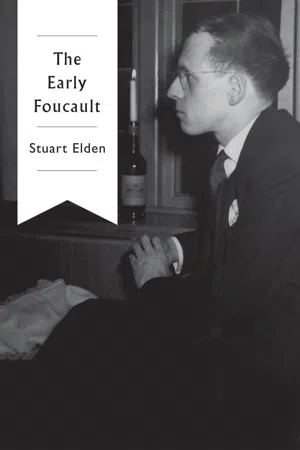The Early Foucault
About this book
It was not until 1961 that Foucault published his first major book, History of Madness. He had already been working as an academic for a decade, teaching in Lille and Paris, writing, organizing cultural programmes and lecturing in Uppsala, Warsaw and Hamburg. Although he published little in this period, Foucault wrote much more, some of which has been preserved and only recently become available to researchers.
Drawing on archives in France, Germany, Switzerland, Sweden and the USA, this is the most detailed study yet of Foucault's early career. It recounts his debt to teachers including Louis Althusser, Jean Hyppolite, Maurice Merleau-Ponty and Jean Wahl; his diploma thesis on Hegel; and his early teaching career. It explores his initial encounters with Georges Canguilhem, Jacques Lacan, and Georges Dumézil, and analyses his sustained reading of Friedrich Nietzsche, Edmund Husserl and Martin Heidegger. Also included are detailed discussions of his translations of Ludwig Binswanger, Victor von Weizsäcker, and Immanuel Kant; his clinical work with Georges and Jacqueline Verdeaux; and his cultural work outside of France.
Investigating how Foucault came to write History of Madness, Stuart Elden shows this great thinker's deep engagement with phenomenology, anthropology and psychology. An outstanding, meticulous work of intellectual history, The Early Foucault sheds new light on the formation of a major twentieth-century figure.
Frequently asked questions
- Essential is ideal for learners and professionals who enjoy exploring a wide range of subjects. Access the Essential Library with 800,000+ trusted titles and best-sellers across business, personal growth, and the humanities. Includes unlimited reading time and Standard Read Aloud voice.
- Complete: Perfect for advanced learners and researchers needing full, unrestricted access. Unlock 1.4M+ books across hundreds of subjects, including academic and specialized titles. The Complete Plan also includes advanced features like Premium Read Aloud and Research Assistant.
Please note we cannot support devices running on iOS 13 and Android 7 or earlier. Learn more about using the app.
Information
1
Studying Philosophy and Psychology in Paris
Philosophy and its History
Table of contents
- Cover
- Endorsement
- Title Page
- Copyright
- Acknowledgements
- Abbreviations and Archival References
- Introduction
- 1 Studying Philosophy and Psychology in Paris
- 2 Teaching at Lille and the École Normale Supérieure
- 3 Psychology and Mental Illness
- 4 Translating Binswanger and von Weizsäcker
- 5 Nietzsche and Heidegger
- 6 Madness – Uppsala to Warsaw
- 7 Hamburg, Kant
- 8 Defence, Publication, Reception, Revision
- Coda: Towards Archaeology
- Index
- End User License Agreement
